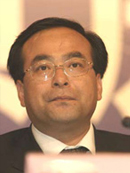Sun Zhengcai 孙政才
Disgraced 6th generation leader
1963
Sacked as Chongqing Party Secretary and under investigation amidst reports of an attempted “coup”

Overview
Pronunciation: Suhn Jung-tsai (Jung as in lung, tsai as in eye) soundbite
Born: 1963
Education: Ph.D. China Agricultural University.
Career: Politburo Member. Party Secretary of Chongqing November 2012 – July 2017. Minister of Agriculture, 2006-09, youngest-ever minister. Initially downplayed seriousness of melamine-tainted baby formula; then vowed to battle those selling tainted milk to dairy companies.
Prospects: Was a sixth generation rising star. Said to be a protégé of Jia Qinglin, himself an ally of Jiang Zemin. Prospects abruptly halted in July 2017 and removed from post; reportedly under investigation.
Relevance to Tibet: None.
Standing in the Party and Career Highlights:
Sun Zhengcai was previously believed to be in line to become China’s Premier in 2022, and was close to ex-President Jiang Zemin’s faction and former Premier Wen Jiabao.
He was removed from his position as Party Secretary of Chongqing on 15 July 2017. The South China Morning Post reported that he was under investigation, suspected of “serious violation of party discipline”. At a panel on the sidelines of the 19th Party Congress in October 2017 Liu Shiyu, chairman of the China Securities Regulatory Commission, accused Sun Zhengcai – among others – of plotting to seize the reins of power.
Sun was replaced by a Xi protégé, Chen Min’er. Sun Zhengcai had been promoted to the Politburo in November 2012 and appointed Party Secretary of Chongqing, succeeding Zhang Dejiang, who had temporarily held the post after the ousting of Bo Xilai.
A Financial Times opinion piece, written by Jamil Anderlini in March 2011 about Sun and Hu Chunhua‘s positions as frontrunners for senior office, said “At the annual meeting of China’s rubber-stamp legislature in Beijing this month neither man even bothered to turn up to the plenary sessions of their respective provinces, although dozens of journalists were there to glimpse the anointed ones. That may have been because of their desire to avoid a media circus, or because of orders from party leaders worried that if they build popular public personas too early, they could circumvent the careful succession process the party is trying to institutionalise.”
Sun Zhengcai’s Contact Information:
- Address: Not known
- Website:
- Phone:
- Fax:
Background information about Sixth Generation Leaders:
“Sixth generation” leaders will reach the top in 2022, when the leaders who took office in 2012 have completed their likely two five-year terms. [Fifth generation heads are Xi Jinping and Li Keqiang; Mao Zedong was first generation.] In 2009 the official journal Global Personalities featured five individuals born in the 1960s who have been cited by the current leadership as likely candidates for high office in 2022.
They are Hu Chunhua, Zhou Qiang, Nur Bekri, Sun Zhengcai, and Lu Hao (China Youth League Head, not Gansu Province Party Secretary). Willy Lam refers to them as having “colossal potential.” Aside from their age and being protégés of Hu Jintao or Wen Jiabao, they have some characteristics in common. At the time of the announcement, they were not well known in China or abroad. None is a princeling. They were all born after the struggle to create the People’s Republic and were too young to be sent-down youths in the Cultural Revolution. Unlike recent leaders, none is an engineer. Three headed the China Youth League.
However, Xi Jinping’s impressive grip on power has raised questions about the continuation of the “tradition” of former leaders selecting their successor’s successor. Kerry Brown, writing in the Diplomat in December 2014 observed: “The idea of Xi Jinping’s predecessor Hu Jintao having much say in [the choice of next leader] seems to grow more remote with each passing day, as Xi appears more and more dominant. It goes against political, let alone psychological, logic to think that Xi might, for mere form’s sake, bow to Hu in his choice. So figures that were eagerly talked about in the past, like Hu Chunhua or Zhou Qiang, seem to be left in the shade now. They were too evidently Hu’s men, married to the low-profile, administrative, and technocratic leadership style so favored by him.”
A general summary of this age group by Melinda Liu, Newsweek, October, 2007:
‘But no one in China is freighted with taller expectations than the offspring of the 1960s. The ’60s Generation, as they’re also known, are seen as worldlier, more traveled and less doctrinaire than any previous Chinese generation. And – though China’s state-run media would never admit it – some Gen-Sixers were probably among the students who rallied at Tiananmen Square in 1989. China will be a different place when they come to power, says Renmin University professor Mao Shoulong. “These younger officials will have liberal thinking and open minds. They’ll see an era of change.”
As a mirror of the society around them, the Gen-Sixers are less ideological and more market-savvy; their peers include private-sector millionaires and environmental activists. But they’re also apt to be nationalistic, even arrogant, some analysts say. “They lack the humility of [their elders],” says Cheng Li, a Sinologist at the Brookings Institution in Washington. “Some of them are quite spoiled, in my view.” They certainly have been fortunate compared with earlier generations. For one thing, their higher education was uninterrupted by the traumatic Cultural Revolution of 1966 – 76, when universities were shuttered and students were shipped off to the backcountry to toil in the fields. Instead, they grew up in the era of “opening up and reform,” as (Gen Two) Deng Xiaoping’s quasi- capitalist policies were called.’
Printing this Page
For best results when printing this page, adjust your print settings by unchecking “print background colours” and “print background images”.

Opinion, Financial Times 24 March 2011. “China’s choice of leaders restricts reform” by Jamil Anderlini, confirms that Hu Chunhua and Sun Zhengcai are frontrunners for 2022 President and Premier respectively. See http://www.ft.com/cms/s/0/59b31690-563c-11e0-82aa-00144feab49a.html